Camera lenses can be classified into two main types: prime and zoom lenses. We will try to explain what the differences are between them, and then we will list the best Fujifilm prime lenses that cover most of the photography genres.
What is a Prim lens?
A prime lens is a lens with a fixed focal length. This means that such a lens has an angle of view that can not be changed (unless you move), you can not make your image appear larger or smaller within the frame. To enlarge your subject and make it fill more of the frame, you have to physically get closer to it. Moreover, to fit more into the frame you have to step back.
An example of a prim lens is the Fujinon XF33mm F1.4 R LM WR
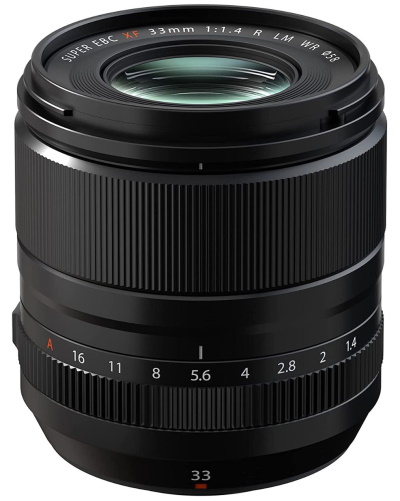
The benefits of using of prim lens
- It tends to be smaller and lighter.
- Many prime lenses are significantly cheaper than their zoom counterparts are.
- A prim lens often has a brighter maximum aperture. Professional prime lenses can go as wide as f/0.95. therefore, they offer better light gathering abilities, and also a shallow depth of field, which can result in photographs with beautifully rendered background highlights known as “Bokeh“. In addition, a fast prime lens will allow you to shoot subjects in low-light environments due to its larger / wider aperture.
- Generally, the faster the lens (wider aperture), the more expensive it will be.
- Primes often have fewer optics inside, which means you can achieve very sharp results from edge to edge.
- A prime lens often shows less distortion than an equivalent zoom, mainly as there are fewer optical problems to overcome
What is a Zoom lens?
A zoom lens, on the other hand, has a variable focal length. By turning the zoom ring, you move optical elements inside the lens to achieve a different angle of view. This means that you can make objects appear larger by turning the zoom ring in one direction or fit more objects into the frame by turning it in the opposite direction.
Zoom lenses have two focal lengths representing the zoom range, for example, a Fujinon XF18-55mmF2.8-4 R LM OIS, may act as an 18mm focal length lens, and 55mm focal length lens, and everything in between.
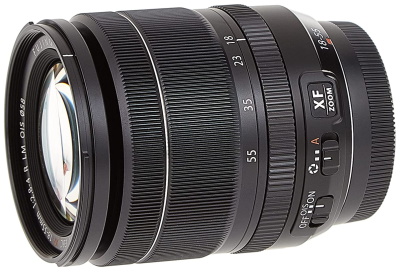
The benefits of using a Zoom lens
- The most obvious reason for using zoom lenses is their versatility. With zoom lenses, you can go from wide-angle to telephoto in a quick turn of the zoom ring without the need to physically move.
- A single zoom lens can replace two or three prime lenses. This also means that you only need to worry about moving around with a single attached lens. A single zoom lens might save you from carrying a large backpack.
How to choose a prime lens
Prime lenses come in many different focal lengths. Choosing one would depend on the types of photography you are interested in. These focal lengths mentioned below are only examples of which type of lens and focal length can be used for different genres.
| Focal Length | Lens type | ||
|---|---|---|---|
| Up to 14mm | Fisheye | ||
| 14mm - 35mm | Wide angle | ||
| 35mm - 85mm | Standard | ||
| 85mm - 135mm | Short Telephoto | ||
| 135mm+ | Medium Telephoto | ||
| 300mm+ | Super Telephoto | ||
| 35mm - 200mm | Macro |
| Lens type | Photography Genres | ||||||
|---|---|---|---|---|---|---|---|
| Fisheye | Abstract | ||||||
| Wide angle | Landscape | Architecture | |||||
| Standard | Street | Travel | |||||
| Short Telephoto | Street | portraits | |||||
| Medium Telephoto | Sports | Wildlife | |||||
| Super Telephoto | Sports | Nature | |||||
| Macro | Close-up |
Best Fuji Prime Lens
Fujifilm has two lens systems, one designed for its X-Mount series and the other designed for its GFX medium format series; I’ll be covering the X-Mount here. X-Mount lenses are designed for X-series bodies, including the X-H, X-Pro, X-T, X-E, and X-A models.
All X-series bodies employ APSC-sized sensors which in turn reduce the field-of-view by 1.5 times, so a 50mm lens becomes equivalent to 75mm on a full-frame body.
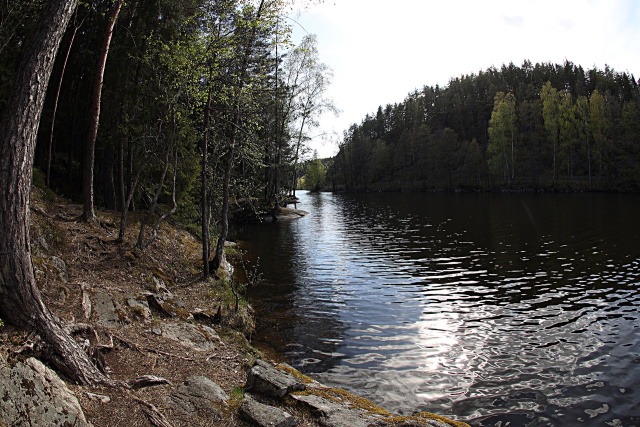
Image by Photorama from Pixabay
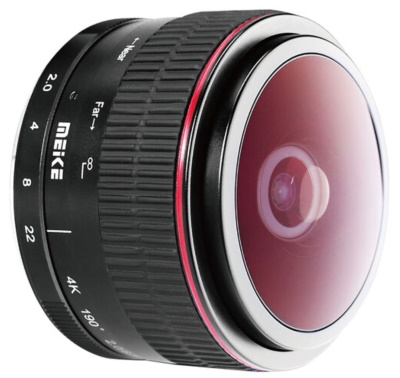
The MK-6.5mm f/2 Circular Fisheye Lens from Mieke is a FUJIFILM X-mount lens providing a 9.75mm equivalent focal length. Its fisheye design realizes an impressive 190° angle of view along with a unique circular image shape and strong distortion for a surreal quality. Individual lens elements feature a multi-layer nano coating to control surface reflections, flare, and ghosting in order to realize a high degree of contrast and color accuracy, even when working in bright and backlit conditions.
Specification
| Focal Length | 6.5mm (35mm Equivalent Focal Length: 9.8mm) |
|---|---|
| Max Aperture | f/2 |
| Min Aperture | f/22 |
| Lens Mount | FUJIFILM X |
| Lens Format Coverage | APS-C |
| Angle of View | 190° |
| Min Focus Distance | Not Specified by Manufacturer |
| Optical Design | 6 Elements in 5 Groups |
| Focus Type | Manual Focus |
| Image Stabilization | No |
| Filter Size | None |
| Dimensions (ø x L) | 2.4 x 2.03" / 61 x 51.5 mm |
| Weight | 10.58 oz / 300 g |
| Pros | Cons |
|---|---|
| Sharp and crisp results | Manual focus virtually impossible |
| Excellent flare resistance | |
| Very low CA | |
| Low price |
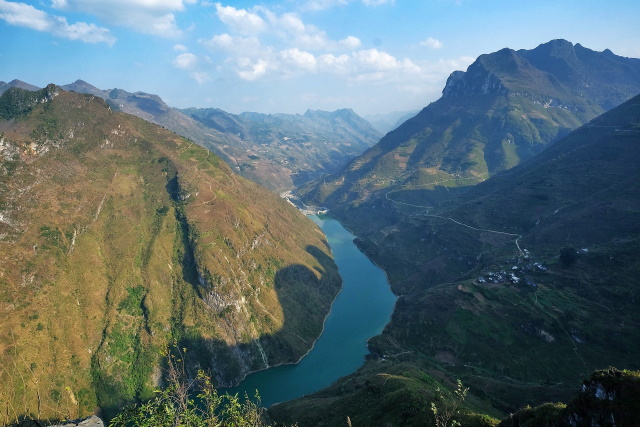
Image by Pham Anh from Pixabay
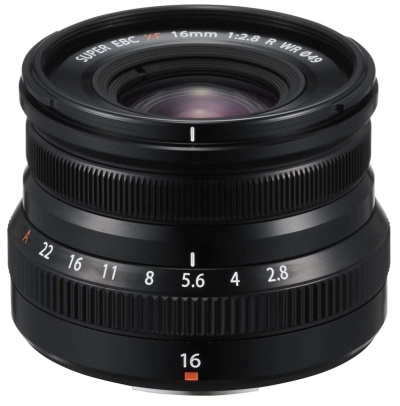
The XF 16mm f/2.8 R WR is well-suited to landscape, nature, and architectural shooting. Its f/2.8 maximum aperture balances size and speed and is suitable for working in available lighting conditions while also limiting the overall size and weight of the lens for everyday use. The optical design features two aspherical elements to reduce distortion and spherical aberrations in order to produce greater sharpness and accurate rendering.
A Super EBC coating is also used to control flare and ghosting for improved contrast and color fidelity when working in bright and backlit conditions.
Complementing the optics is a stepping motor, along with an internal focusing design, which provides quick and especially quiet focusing performance. Additionally, the lens is weather-sealed to suit working in inclement conditions.
Specification
| Focal Length | 16mm (35mm Equivalent Focal Length: 24mm) |
|---|---|
| Max Aperture | f/2.8 |
| Min Aperture | f/22 |
| Lens Mount | FUJIFILM X |
| Lens Format | APS-C |
| Angle of View | 83.2° |
| Min Focus Distance | 6.69" / 17 cm |
| Max Magnification | 0.13x |
| Optical Design | 10 Elements in 8 Groups |
| Diaphragm Blades | 9, Rounded |
| Focus Type | Autofocus |
| Image Stabilization | No |
| Filter Size | 49 mm (Front) |
| Dimensions (ø x L) | 2.36 x 1.79" / 60 x 45.4 mm |
| Weight | 5.5 oz / 155 g |
| PROS | CONS |
|---|---|
| Compact. | Loss of clarity at edges of frame. |
| Sharp images. | Not stabilized. |
| All-weather build. | Omits fluorine coat. |
| Even illumination. | |
| Aperture ring. | |
| Minimal distortion. |

The XF 18mm f/1.4 R WR Lens is well-suited to documentary, travel, landscape, nature, architectural photography, and even astrophotography. Its fast f/1.4 maximum aperture suits working in available light conditions while maintaining a compact form factor.
It offers greater control over the depth of field and provides a soft bokeh effect at wider apertures while also limiting the overall size and weight of the lens for everyday use.
Optical elements feature Super EBC coating to reduce lens flare and ghosting for improved contrast and color fidelity.
The lens has a linear autofocus motor that provides fast and responsive, near-silent AF down to a minimum object distance of just 7.9″ / 20cm in as little as 0.04 seconds. It also features an internal focusing design, and smooth manual focusing control.
Specification
| Focal Length | 18mm (35mm Equivalent Focal Length: 27mm) |
|---|---|
| Max Aperture | f/1.4 |
| Min Aperture | f/16 |
| Lens Mount | FUJIFILM X |
| Lens Format | APS-C |
| Angle of View | 76.5° |
| Min Focus Distance | 7.9" / 20 cm |
| Max Magnification | 0.15x |
| Optical Design | 15 Elements in 9 Groups |
| Diaphragm Blades | 9, Rounded |
| Focus Type | Autofocus |
| Image Stabilization | No |
| Filter Size | 62 mm (Front) |
| Dimensions (ø x L) | 2.7 x 3" / 68.8 x 75.6 mm |
| Weight | 13.1 oz / 370 g |
| Pros: | Cons: | |||
|---|---|---|---|---|
| Solid lens that is well made. | There is a slight “clunk” noise inside the lens when it’s not powered. | |||
| Compact, light, and generally easy to handle: great ergonomics. | It’s not cheap. | |||
| Weather and dust sealed. | ||||
| Blazingly fast autofocus. | ||||
| Superb image quality. | ||||
| Fast f1.4 aperture. | ||||
| Great bokeh. |

Image by JasperSinn from Pixabay
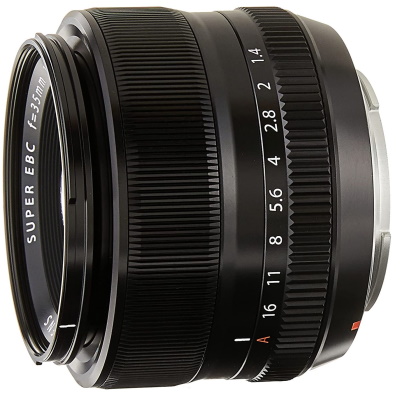
The XF 35mm f/1.4 R is a 53mm-equivalent lens characterized by its bright f/1.4 maximum aperture. This design benefits working in difficult lighting conditions and also affords greater control over depth of field for isolating subject matter and using selective focus techniques.
The optical design employs one aspherical element, which reduces distortion and spherical aberrations in order to achieve higher sharpness and accurate rendering.
The rounded seven-blade diaphragm contributes to a pleasing Bokeh quality.
A Super EBC coating is also featured, which reduces flare and ghosting for improved contrast and color fidelity.
Specification
| Focal Length | 35mm (35mm Equivalent Focal Length: 53mm) |
|---|---|
| Max Aperture | f/1.4 |
| Min Aperture | f/16 |
| Lens Mount | FUJIFILM X |
| Lens Format | APS-C |
| Angle of View | 44.2° |
| Min Focus Distance | 11.02" / 28 cm |
| Max Magnification | 0.17x |
| Optical Design | 8 Elements in 6 Groups |
| Diaphragm Blades | 7, Rounded |
| Focus Type | Autofocus |
| Image Stabilization | No |
| Filter Size | 52 mm (Front) |
| Dimensions (ø x L) | 2.56 x 2.16" / 65 x 54.9 mm |
| Weight | 6.6 oz / 187 g |
| Pros | Cons | ||
|---|---|---|---|
| Stunning image quality and bokeh | It can be slow to focus / hunt for focus, especially in low light | ||
| Fast wide f1.4 aperture | The focus motor is not super quiet l | ||
| Robustness and build quality | It is a bit heavier | ||
| It’s not weather-sealed |
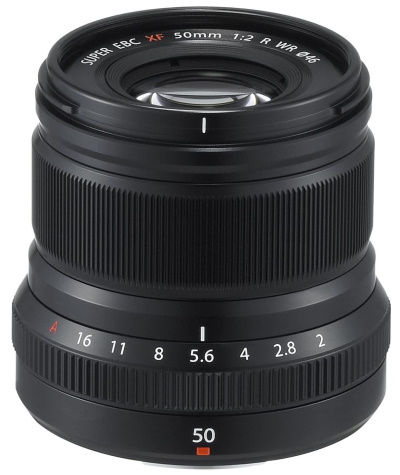
The XF 50mm f/2 R WR offers a 76mm equivalent focal length to suit a variety of applications, including portraiture and still lifes. The lightweight design and bright f/2 maximum aperture benefit working in low-light conditions and also afford a high degree of control over the depth of field for selective focus techniques.
The optical design features one aspherical ED element, which controls distortion and color fringing for sharper, clearer results throughout the aperture range.
A Super EBC coating is also used to control flare and ghosting for improved contrast and color fidelity when working in bright and backlit conditions.
Complementing the optics is a stepping motor, along with an internal focusing design, which provides quick and especially quiet focusing performance.
Additionally, the lens is weather-sealed to suit working in inclement conditions.
Specification
| Focal Length | 50mm (35mm Equivalent Focal Length: 76mm) |
|---|---|
| Max Aperture | f/2 |
| Min Aperture | f/16 |
| Lens Mount | FUJIFILM X |
| Lens Format | APS-C |
| Angle of View | 31.7° |
| Min Focus Distance | 1.28' / 39 cm |
| Max Magnification | 0.15x |
| Optical Design | 9 Elements in 7 Groups |
| Diaphragm Blades | 9, Rounded |
| Focus Type | Autofocus |
| Image Stabilization | No |
| Filter Size | 46 mm (Front) |
| Dimensions (ø x L) | 2.36 x 2.34" / 60 x 59.4 mm |
| Weight | 7.05 oz / 200 g |
| PROS | CONS |
|---|---|
| Very compact. | Omits optical stabilization. |
| Super sharp. | Limited close focus. |
| Strong illumination. | |
| No distortion. |
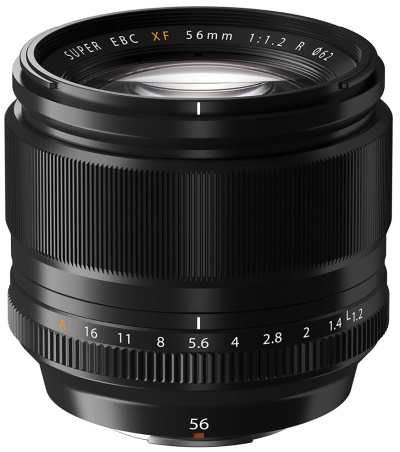
On a crop sensor, the 56mm f1.2 lens is equivalent to an 85mm lens on a full-frame camera. This is perhaps one of the classic focal lengths for portrait photography.
Perfect for portraiture, the XF 56mm f/1.2 R from FUJIFILM is an 85mm-equivalent prime distinguished by its exceedingly fast f/1.2 maximum aperture for isolating subjects and working in low-light conditions.
The optical design employs both aspherical and extra-low dispersion elements, which help to reduce a variety of aberrations, color fringing, and distortion to achieve high sharpness and clarity.
A Super EBC coating is used, too, to reduce flare and ghosting for improved contrast and color accuracy in bright and backlit conditions.
Additionally, this lens also features an internal focusing mechanism for quick focusing performance along with a rounded seven-blade diaphragm to produce a pleasing bokeh quality.
Specification
Focal Length 56mm (35mm Equivalent Focal Length: 85mm)
Maximum Aperture f/1.2
Minimum Aperture f/16
Lens Mount FUJIFILM X
Lens Format Coverage APS-C
Angle of View 28.5°
Min Focus Distance 2.3' / 70 cm
Max Magnification 0.09x
Optical Design 11 Elements in 8 Groups
Diaphragm Blades 7, Rounded
Focus Type Autofocus
Image Stabilization No
Filter Size 62 mm (Front)
Dimensions (ø x L) 2.88 x 2.74" / 73.2 x 69.7 mm
Weight 14.29 oz / 405 g
| Pros: | Cons: | |||
|---|---|---|---|---|
| The best Fujifilm sharpness | The AF motor is not the fastest | |||
| A fast aperture of 1.2 | Fly by wire focus ring lacks precision | |||
| Pleasant bokeh | ||||
| Easy to find second hand |
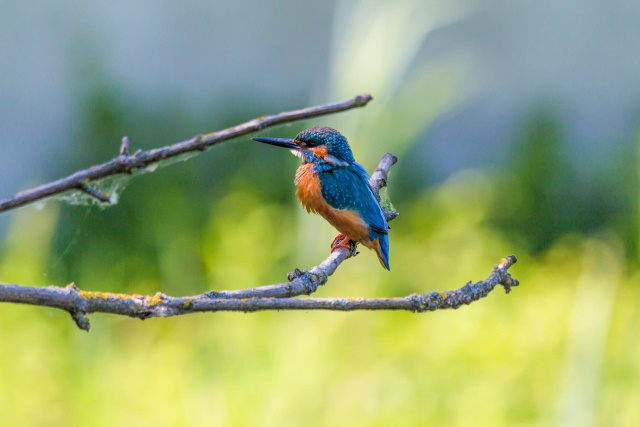
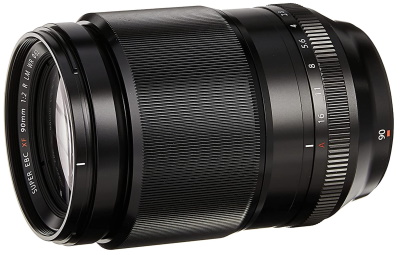
The XF 90mm f/2 R LM WR is a 137mm-equivalent lens featuring a bright f/2 maximum aperture for low-light performance and extensive control over focus placement.
The optical design incorporates three extra-low dispersion elements to minimize chromatic aberrations and color fringing and a Super EBC coating has been applied to control flare and ghosting for increased contrast and color fidelity.
Complementing the optical assets, this lens also features a weather-sealed design for working in harsh environments and has a Quad Linear Motor for quick, quiet, and precise autofocus performance.
Specification
| Focal Length | 90mm (35mm Equivalent Focal Length: 137mm) |
|---|---|
| Max Aperture | f/2 |
| Min Aperture | f/16 |
| Lens Mount | FUJIFILM X |
| Lens Format | APS-C |
| Angle of View | 17.9° |
| Min Focus Distance | 1.97' / 60 cm |
| Max Magnification | 0.2x |
| Optical Design | 11 Elements in 8 Groups |
| Diaphragm Blades | 7, Rounded |
| Focus Type | Autofocus |
| Image Stabilization | No |
| Filter Size | 62 mm (Front) |
| Dimensions (ø x L) | 2.95 x 4.13" / 75 x 105 mm |
| PROS | CONS | |||
|---|---|---|---|---|
| Sharp from edge to edge. | Manual focus by wire. | |||
| No distortion. | Omits image stabilization. | |||
| Even illumination across the frame. | ||||
| Fast focus. | ||||
| Wide aperture. | ||||
| Weather-resistant design. |
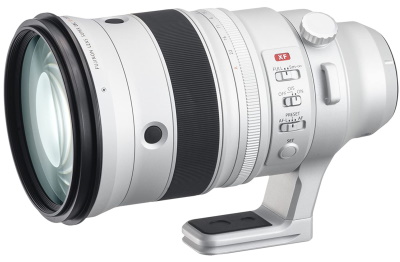
The FUJIFILM XF 200mm f/2 R LM OIS WR is a 305mm-equivalent lens further characterized by its sophisticated optical layout, fast performance, and apt image stabilization.
Well-suited for sports, events, and wildlife photography, the impressive f/2 maximum aperture suits working in a variety of lighting conditions and also promotes working with shallow depth of field and selective focus techniques.
The optical design features three extra-low dispersion elements, including one Super ED element, which help to achieve greater clarity and color accuracy by controlling fringing and chromatic aberrations.
A Super EBC coating is also used to suppress flare for improved contrast and color rendering. Complementing the optics is a linear motor-based autofocus system, which offers fast, near-silent performance for both stills and video use.
Additionally, a five-stop-effective optical image stabilization system minimizes the appearance of camera shake for sharper results. Suiting the lens’s use in inclement conditions, it is also weather-sealed to resist and dust and moisture and a fluorine coating have been applied to the front element.
Specification
| Focal Length | 200mm (35mm Equivalent Focal Length: 305mm) |
|---|---|
| Max Aperture | f/2 |
| Min Aperture | f/22 |
| Lens Mount | FUJIFILM X |
| Lens Format | APS-C |
| Angle of View | 8.1° |
| Min Focus Distance | 5.91' / 1.8 m |
| Max Magnification | 0.12x |
| Optical Design | 19 Elements in 14 Groups |
| Diaphragm Blades | 9, Rounded |
| Focus Type | Autofocus |
| Image Stabilization | Yes |
| Tripod Collar | Fixed and Rotating |
| Filter Size | 105 mm (Front) |
| Dimensions (ø x L) | 4.8 x 8.09" / 122 x 205.5 mm |
| Weight | 4.98 lb / 2265 g |
| PROS | CONS |
|---|---|
| Bright aperture. | Expensive. |
| Strong image stabilization. | Heavy. |
| Very sharp. | Large front element requires pricey 105mm filters. |
| No distortion. | |
| Minimal vignette. | |
| Useful physical controls. | |
| Dust and splash protection. |
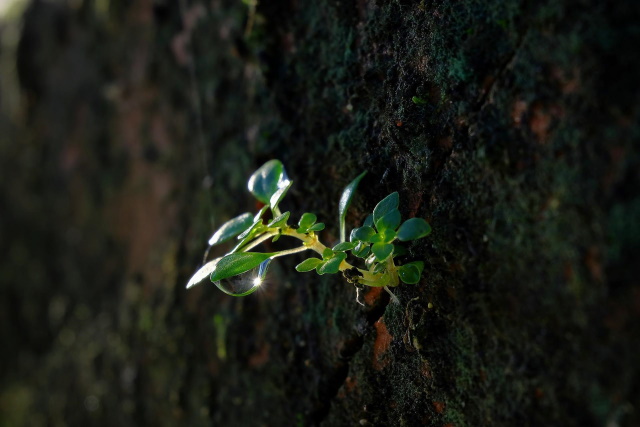
Image by Pham Anh from Pixabay
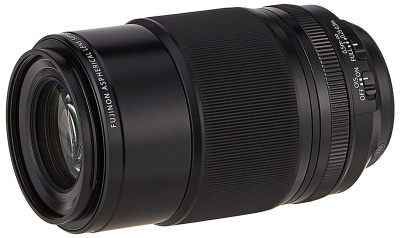
the FUJIFILM XF 80mm f/2.8 R LM OIS WR Macro is a 122mm equivalent telephoto prime for X-mount mirrorless cameras. The long focal length coupled with the f/2.8 maximum aperture is well-suited to isolating subject matter, especially when paired with the short 9.8″ minimum focusing distance, and a 1:1 life-size magnification is ideal for macro shooting.
A Floating Focus System benefits close-up work by using two distinct focusing groups in order to maintain image quality throughout the focus range, and a linear motor ensures quick, quiet autofocus performance.
Additionally, a five-stop-effective optical image stabilization system complements making sharp imagery by minimizing the appearance of a camera shake.
Regarding the optical design, this lens employs one aspherical element and four low-dispersion elements to realize sharp, clear imagery void of both chromatic and spherical aberrations.
A Super EBC coating has also been applied to suppress flare and ghosting when working in bright and backlit conditions.
Additionally, enabling the lens’s use in harsh environments, it is weather-sealed and also features a fluorine coating on the front element to guard against moisture, smudging, and dust.
Specification
| Focal Length | 80mm (35mm Equivalent Focal Length: 122mm) |
|---|---|
| Max Aperture | f/2.8 |
| Min Aperture | f/22 |
| Lens Mount | FUJIFILM X |
| Lens Format | APS-C |
| Angle of View | 20.1° |
| Min Focus Distance | 9.84" / 25 cm |
| Max Magnification | 1x |
| Macro Reproduction Ratio | 1970-01-01 01:01:00 |
| Optical Design | 16 Elements in 12 Groups |
| Diaphragm Blades | 9, Rounded |
| Focus Type | Autofocus |
| Image Stabilization | Yes |
| Filter Size | 62 mm (Front) |
| Dimensions (ø x L) | 3.15 x 5.12" / 80 x 130 mm |
| Length at Maximum Extension | 5.11" / 129.7 mm |
| Weight | 1.65 lb / 750 g |
| Pros | Cons | |||
|---|---|---|---|---|
| Solid construction. | The lens is heavy and large, especially on a Fuji body. | |||
| Weather and dust sealed. | ||||
| Ultra fast autofocus. | ||||
| Fantastic image quality. | ||||
| Very sharp lens. | ||||
| Great bokeh. | ||||
| 1:1 macro capability. |
Related posts
Can’t afford a brand-new lens?
Sometimes, buying a new Lens can be very expensive for many people. However, Keh is a great option to get a used one at a reasonable price. Read the full review here.
Thanks for reading, I hope you enjoyed the article, in case you have any questions just drop them below & I will be happy to answer you.
The featured Photo by Fujifilm North America
If you enjoy the site, don’t forget to subscribe, we will only inform you when a new article is posted.






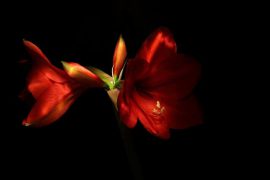
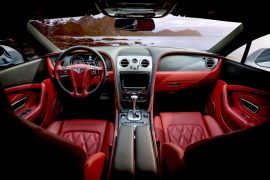
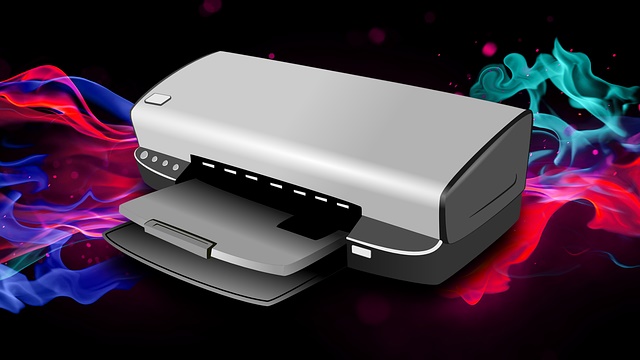
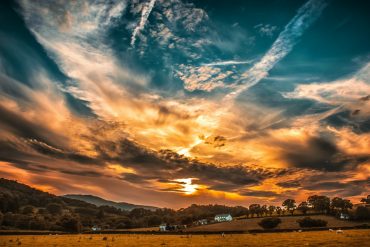
Hi and thank you for the detailed review on Fuji lenses.
I’m looking to start taking pictures of the moon as a hobbie. I’m guessing I will need a good quality zoom lense I was wondering if any of these lenses would be good for that. If not could you please point me in the right direction.
You can take good images of the Moon with your camera and a 250 mm telephoto lens. To get the best detail, you need a telephoto lens of 500 to 600 mm. the Fujinon XF200mmF2 R LM OIS WR Lens can make amazing shots.
Thanks for your comment
Thank you very much for this valuable detailed guide on Best Fuji Prime Lens. I am learning about photography these days. And I am looking forward to buy a fuji camera. So this guide is very valuable to me. I think I like this Fujinon XF18mm F1.4 R LM WR. Because I am a traveler. It will allow me to take good nature photos. Keep posting guides like this.
Thanks, I wish you happy learning!